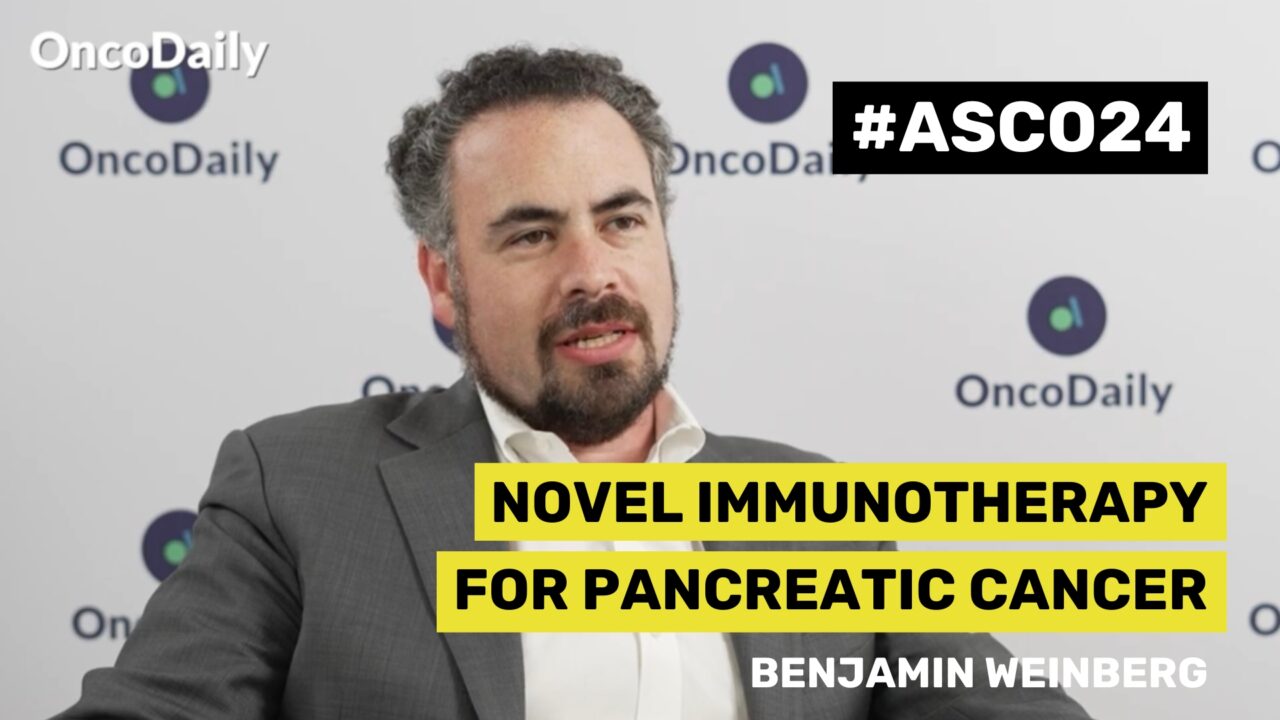
ASCO24 Updates: Benjamin Weinberg on Novel Immunotherapy for Pancreatic Cancer
The American Society of Clinical Oncology (ASCO) Annual Meeting is one of the largest and most prestigious conferences in the field of oncology. This year, the meeting took place from May 31 to June 4 in Chicago, Illinois. The event gathers oncologists, researchers, and healthcare professionals from around the world to discuss the latest advancements in cancer research, treatment, and patient care. Keynote sessions, research presentations, and panel discussions are typically part of the agenda, providing attendees with valuable insights into emerging trends and innovations in oncology.
This year, OncoDaily was at ASCO 2024 for the first time covering the meeting on-site. We had the pleasure of interviewing researchers who summarized the highlights of their work.
In this video, Dr. Benjamin Weinberg, gastrointestinal oncologist at Georgetown University, shared insights on ‘Phase II trial of BXCL701 and pembrolizumab in patients with metastatic pancreatic ductal adenocarcinoma (EXPEL-PANC).’
I’m Benjamin Weinberg, a gastrointestinal medical oncologist at the Ruesch Center for the Cure of Gastrointestinal Cancers at Lombardi Comprehensive Cancer Center at Georgetown University in Washington, D.C. Today, I’ll be discussing our research on pancreatic cancer.
As many know, pancreatic cancer is a devastating disease with very few treatment options, most of which involve chemotherapy. We’ve tried a different strategy using immunotherapy as an alternative treatment modality for these patients. Historically, immunotherapy has not worked in the vast majority of patients with pancreatic cancer.
We tested a novel combination of a known immunotherapy drug, pembrolizumab, an anti-PD-1 monoclonal antibody, with a novel oral drug called BioXcel 701. BioXcel 701 inhibits several targets, including dipeptidyl peptidases 4, 8, and 9, as well as fibroblast activation protein (FAP).
We believe this drug has two mechanisms of action. First, it induces the inflammasome through the induction of CXCL9 and CXCL10, allowing more immune cells into the tumor microenvironment. Second, it disrupts some of the desmoplastic stroma through antifibrotic properties, which also permits better influx of immune cells.
In preclinical models in mice, led by my colleague and collaborator Dr. Louis Weiner, it was shown that combining BioXcel 701 with pembrolizumab (or a similar anti-PD-1 monoclonal antibody) resulted in an influx of immune cells. This combination required the presence of not only T cells but also natural killer (NK) cells.
We are currently conducting a human phase 2 trial using pembrolizumab, administered at a flat dose of 200 milligrams IV every three weeks, alongside BioXcel 701 at 0.3 milligrams twice a day, two weeks on and one week off. For the very first cycle, we use a reduced dose of 0.2 milligrams BID during the first week to monitor for a potential side effect: hypotension. Beyond that, patients receive the same flat dose. Scans are conducted every nine weeks, and we are performing pre- and on-treatment biopsies to determine if we observe the influx of immune cells seen in mouse models in humans receiving the same combination.
At ASCO 2024, we presented our findings from the first six patients treated in this study. Three patients demonstrated dramatic early CA 19-9 responses, and two achieved disease control. One patient had a partial response and was found to be microsatellite instability-high (MSI-high), while another patient with microsatellite-stable (MSS) disease achieved stable disease. In longer follow-up, not presented at ASCO, this second patient also achieved a partial response.
Thus, two out of six patients exhibited partial responses. We are encouraged by these results and are accruing participants rapidly. The safety run-in phase of the study has been completed.
The study design is a Simon two-stage design. If seven out of the first 19 patients achieve disease control or better at 18 weeks (by the second scan), the study will advance to the second stage. The second stage aims to achieve disease control or better in 19 out of a total of 43 patients.
The study is open at MedStar Georgetown University Hospital, MedStar Washington Hospital Center, and will soon be open at Hackensack University Medical Center in Hackensack, New Jersey.
More videos and content from ASCO 2024 on OncoDaily.
-
Challenging the Status Quo in Colorectal Cancer 2024
December 6-8, 2024
-
ESMO 2024 Congress
September 13-17, 2024
-
ASCO Annual Meeting
May 30 - June 4, 2024
-
Yvonne Award 2024
May 31, 2024
-
OncoThon 2024, Online
Feb. 15, 2024
-
Global Summit on War & Cancer 2023, Online
Dec. 14-16, 2023
